Organizational Change and Behavior at IBM: A Comprehensive Analysis
VerifiedAdded on 2021/05/31
|11
|2733
|79
Report
AI Summary
This report provides a comprehensive analysis of IBM's organizational behavior, highlighting the need for change in its culture, structure, and technology. It examines the company's history, current challenges, and internal and external factors influencing the need for transformation. The report discusses key aspects of organizational behavior, including culture, visible and invisible elements, and the impact of hierarchy and bureaucracy on innovation and employee morale. It also assesses IBM's position in the market, particularly in cloud computing and its competition. The report applies Kurt Lewin's Force Field analysis to identify driving and restoring forces for change and proposes a three-stage planned change process, including unfreezing, changing, and refreezing, with specific recommendations for technological advancements, structural adjustments, and cultural shifts. It emphasizes the importance of fostering innovation, reducing hierarchy, and adapting to market dynamics to ensure IBM's long-term success. The report concludes with recommendations to help IBM remain a competitive leader in the industry. This assignment is contributed by a student to be published on the website Desklib. Desklib is a platform which provides all the necessary AI based study tools for students.
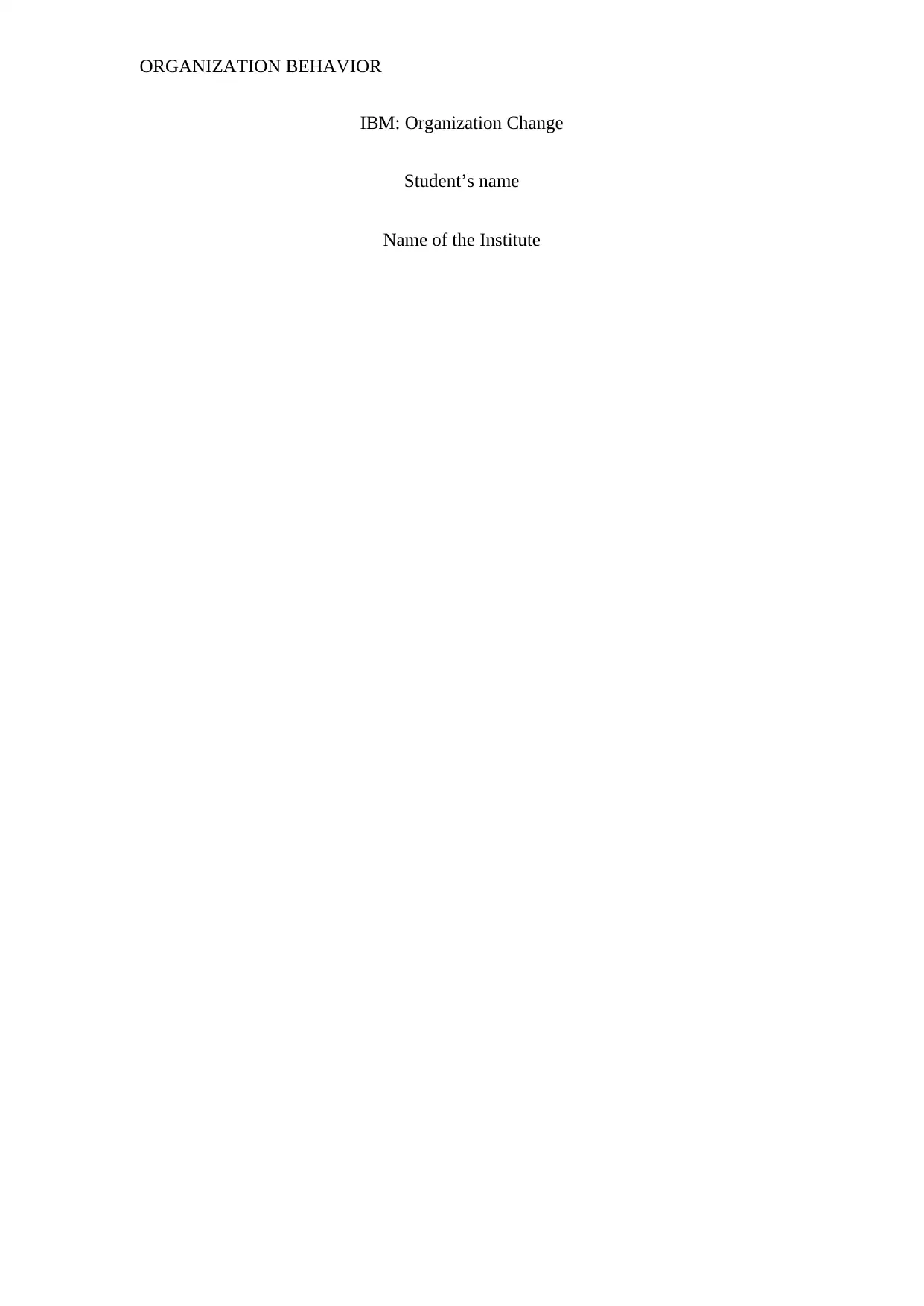
ORGANIZATION BEHAVIOR
IBM: Organization Change
Student’s name
Name of the Institute
IBM: Organization Change
Student’s name
Name of the Institute
Paraphrase This Document
Need a fresh take? Get an instant paraphrase of this document with our AI Paraphraser
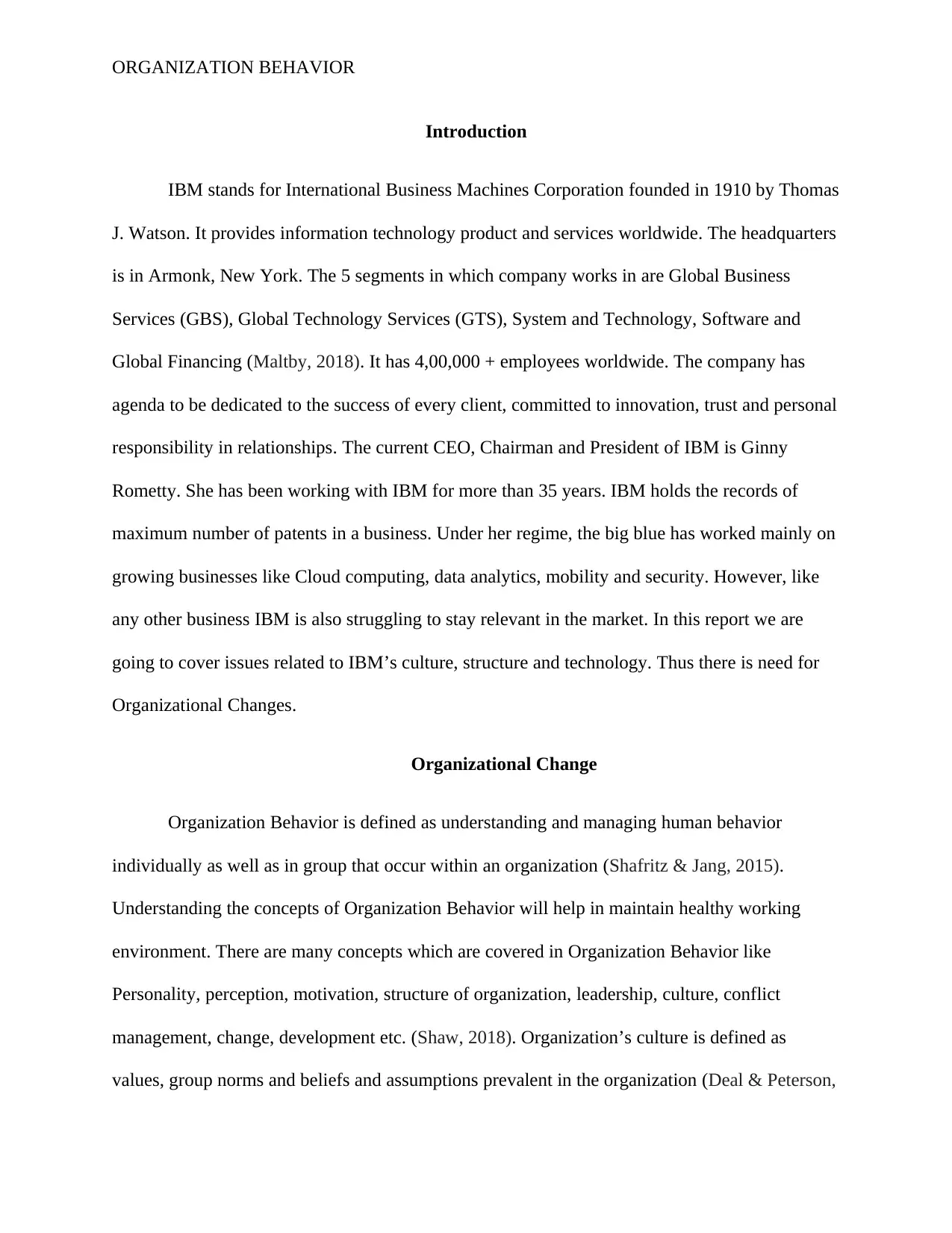
ORGANIZATION BEHAVIOR
Introduction
IBM stands for International Business Machines Corporation founded in 1910 by Thomas
J. Watson. It provides information technology product and services worldwide. The headquarters
is in Armonk, New York. The 5 segments in which company works in are Global Business
Services (GBS), Global Technology Services (GTS), System and Technology, Software and
Global Financing (Maltby, 2018). It has 4,00,000 + employees worldwide. The company has
agenda to be dedicated to the success of every client, committed to innovation, trust and personal
responsibility in relationships. The current CEO, Chairman and President of IBM is Ginny
Rometty. She has been working with IBM for more than 35 years. IBM holds the records of
maximum number of patents in a business. Under her regime, the big blue has worked mainly on
growing businesses like Cloud computing, data analytics, mobility and security. However, like
any other business IBM is also struggling to stay relevant in the market. In this report we are
going to cover issues related to IBM’s culture, structure and technology. Thus there is need for
Organizational Changes.
Organizational Change
Organization Behavior is defined as understanding and managing human behavior
individually as well as in group that occur within an organization (Shafritz & Jang, 2015).
Understanding the concepts of Organization Behavior will help in maintain healthy working
environment. There are many concepts which are covered in Organization Behavior like
Personality, perception, motivation, structure of organization, leadership, culture, conflict
management, change, development etc. (Shaw, 2018). Organization’s culture is defined as
values, group norms and beliefs and assumptions prevalent in the organization (Deal & Peterson,
Introduction
IBM stands for International Business Machines Corporation founded in 1910 by Thomas
J. Watson. It provides information technology product and services worldwide. The headquarters
is in Armonk, New York. The 5 segments in which company works in are Global Business
Services (GBS), Global Technology Services (GTS), System and Technology, Software and
Global Financing (Maltby, 2018). It has 4,00,000 + employees worldwide. The company has
agenda to be dedicated to the success of every client, committed to innovation, trust and personal
responsibility in relationships. The current CEO, Chairman and President of IBM is Ginny
Rometty. She has been working with IBM for more than 35 years. IBM holds the records of
maximum number of patents in a business. Under her regime, the big blue has worked mainly on
growing businesses like Cloud computing, data analytics, mobility and security. However, like
any other business IBM is also struggling to stay relevant in the market. In this report we are
going to cover issues related to IBM’s culture, structure and technology. Thus there is need for
Organizational Changes.
Organizational Change
Organization Behavior is defined as understanding and managing human behavior
individually as well as in group that occur within an organization (Shafritz & Jang, 2015).
Understanding the concepts of Organization Behavior will help in maintain healthy working
environment. There are many concepts which are covered in Organization Behavior like
Personality, perception, motivation, structure of organization, leadership, culture, conflict
management, change, development etc. (Shaw, 2018). Organization’s culture is defined as
values, group norms and beliefs and assumptions prevalent in the organization (Deal & Peterson,
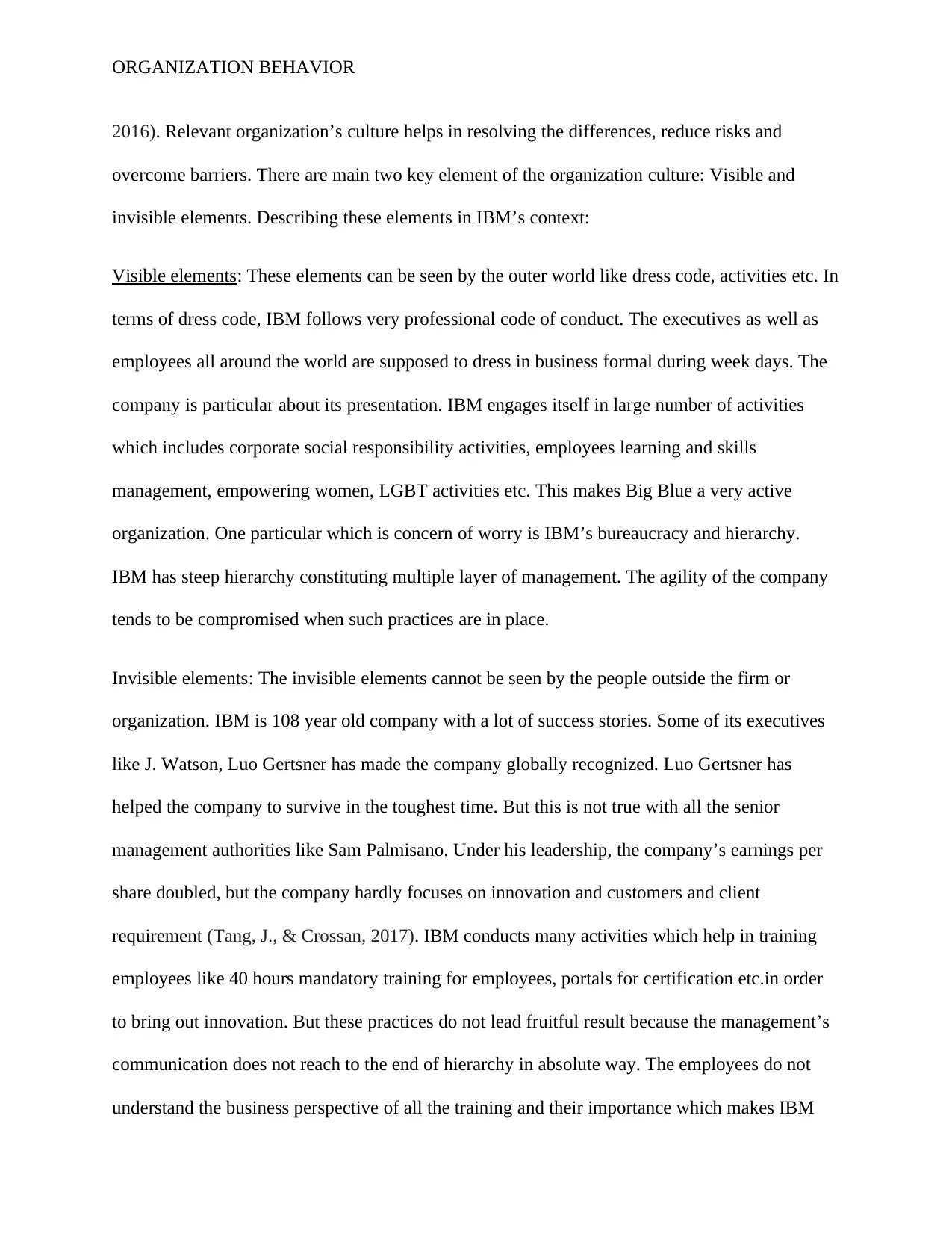
ORGANIZATION BEHAVIOR
2016). Relevant organization’s culture helps in resolving the differences, reduce risks and
overcome barriers. There are main two key element of the organization culture: Visible and
invisible elements. Describing these elements in IBM’s context:
Visible elements: These elements can be seen by the outer world like dress code, activities etc. In
terms of dress code, IBM follows very professional code of conduct. The executives as well as
employees all around the world are supposed to dress in business formal during week days. The
company is particular about its presentation. IBM engages itself in large number of activities
which includes corporate social responsibility activities, employees learning and skills
management, empowering women, LGBT activities etc. This makes Big Blue a very active
organization. One particular which is concern of worry is IBM’s bureaucracy and hierarchy.
IBM has steep hierarchy constituting multiple layer of management. The agility of the company
tends to be compromised when such practices are in place.
Invisible elements: The invisible elements cannot be seen by the people outside the firm or
organization. IBM is 108 year old company with a lot of success stories. Some of its executives
like J. Watson, Luo Gertsner has made the company globally recognized. Luo Gertsner has
helped the company to survive in the toughest time. But this is not true with all the senior
management authorities like Sam Palmisano. Under his leadership, the company’s earnings per
share doubled, but the company hardly focuses on innovation and customers and client
requirement (Tang, J., & Crossan, 2017). IBM conducts many activities which help in training
employees like 40 hours mandatory training for employees, portals for certification etc.in order
to bring out innovation. But these practices do not lead fruitful result because the management’s
communication does not reach to the end of hierarchy in absolute way. The employees do not
understand the business perspective of all the training and their importance which makes IBM
2016). Relevant organization’s culture helps in resolving the differences, reduce risks and
overcome barriers. There are main two key element of the organization culture: Visible and
invisible elements. Describing these elements in IBM’s context:
Visible elements: These elements can be seen by the outer world like dress code, activities etc. In
terms of dress code, IBM follows very professional code of conduct. The executives as well as
employees all around the world are supposed to dress in business formal during week days. The
company is particular about its presentation. IBM engages itself in large number of activities
which includes corporate social responsibility activities, employees learning and skills
management, empowering women, LGBT activities etc. This makes Big Blue a very active
organization. One particular which is concern of worry is IBM’s bureaucracy and hierarchy.
IBM has steep hierarchy constituting multiple layer of management. The agility of the company
tends to be compromised when such practices are in place.
Invisible elements: The invisible elements cannot be seen by the people outside the firm or
organization. IBM is 108 year old company with a lot of success stories. Some of its executives
like J. Watson, Luo Gertsner has made the company globally recognized. Luo Gertsner has
helped the company to survive in the toughest time. But this is not true with all the senior
management authorities like Sam Palmisano. Under his leadership, the company’s earnings per
share doubled, but the company hardly focuses on innovation and customers and client
requirement (Tang, J., & Crossan, 2017). IBM conducts many activities which help in training
employees like 40 hours mandatory training for employees, portals for certification etc.in order
to bring out innovation. But these practices do not lead fruitful result because the management’s
communication does not reach to the end of hierarchy in absolute way. The employees do not
understand the business perspective of all the training and their importance which makes IBM
⊘ This is a preview!⊘
Do you want full access?
Subscribe today to unlock all pages.

Trusted by 1+ million students worldwide
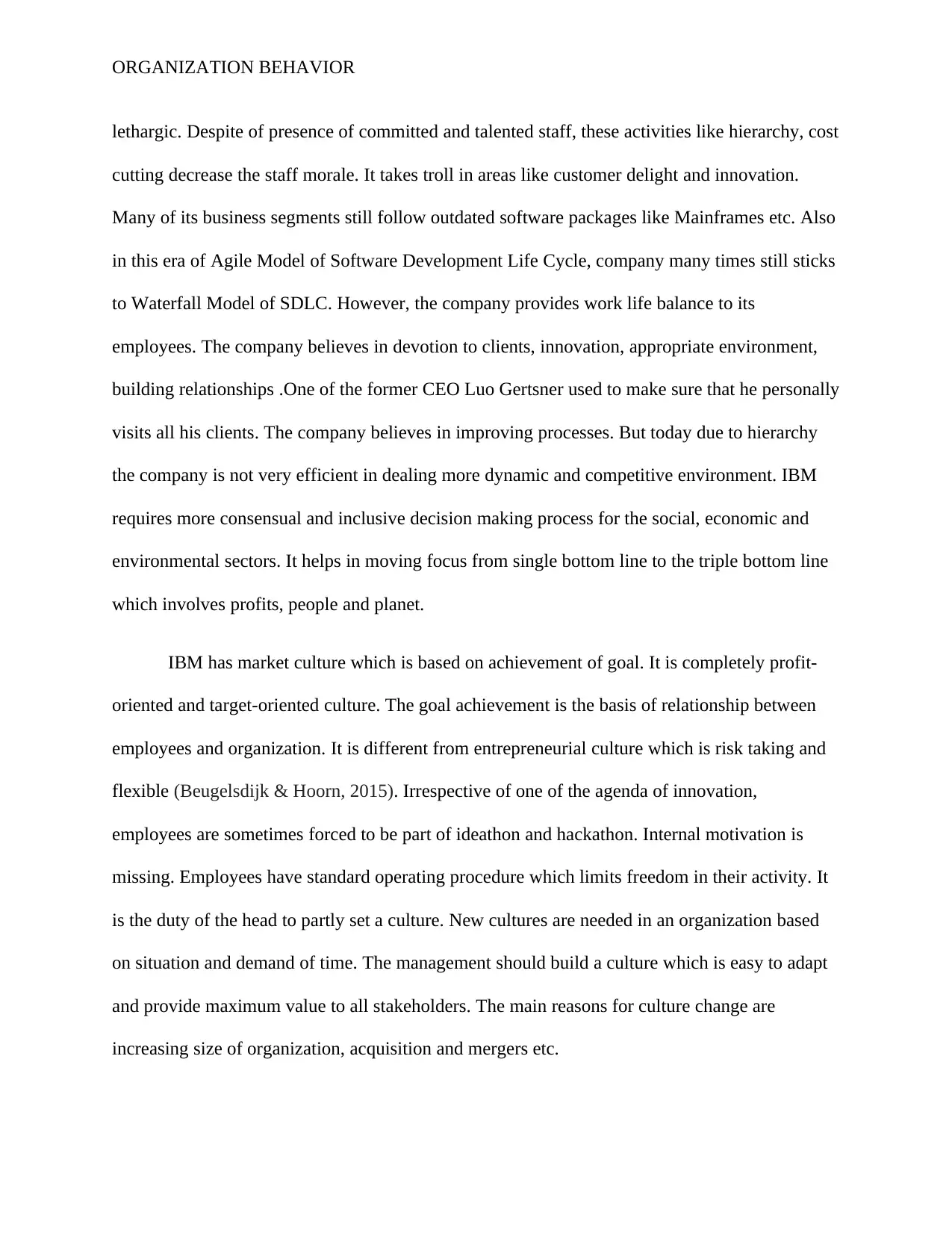
ORGANIZATION BEHAVIOR
lethargic. Despite of presence of committed and talented staff, these activities like hierarchy, cost
cutting decrease the staff morale. It takes troll in areas like customer delight and innovation.
Many of its business segments still follow outdated software packages like Mainframes etc. Also
in this era of Agile Model of Software Development Life Cycle, company many times still sticks
to Waterfall Model of SDLC. However, the company provides work life balance to its
employees. The company believes in devotion to clients, innovation, appropriate environment,
building relationships .One of the former CEO Luo Gertsner used to make sure that he personally
visits all his clients. The company believes in improving processes. But today due to hierarchy
the company is not very efficient in dealing more dynamic and competitive environment. IBM
requires more consensual and inclusive decision making process for the social, economic and
environmental sectors. It helps in moving focus from single bottom line to the triple bottom line
which involves profits, people and planet.
IBM has market culture which is based on achievement of goal. It is completely profit-
oriented and target-oriented culture. The goal achievement is the basis of relationship between
employees and organization. It is different from entrepreneurial culture which is risk taking and
flexible (Beugelsdijk & Hoorn, 2015). Irrespective of one of the agenda of innovation,
employees are sometimes forced to be part of ideathon and hackathon. Internal motivation is
missing. Employees have standard operating procedure which limits freedom in their activity. It
is the duty of the head to partly set a culture. New cultures are needed in an organization based
on situation and demand of time. The management should build a culture which is easy to adapt
and provide maximum value to all stakeholders. The main reasons for culture change are
increasing size of organization, acquisition and mergers etc.
lethargic. Despite of presence of committed and talented staff, these activities like hierarchy, cost
cutting decrease the staff morale. It takes troll in areas like customer delight and innovation.
Many of its business segments still follow outdated software packages like Mainframes etc. Also
in this era of Agile Model of Software Development Life Cycle, company many times still sticks
to Waterfall Model of SDLC. However, the company provides work life balance to its
employees. The company believes in devotion to clients, innovation, appropriate environment,
building relationships .One of the former CEO Luo Gertsner used to make sure that he personally
visits all his clients. The company believes in improving processes. But today due to hierarchy
the company is not very efficient in dealing more dynamic and competitive environment. IBM
requires more consensual and inclusive decision making process for the social, economic and
environmental sectors. It helps in moving focus from single bottom line to the triple bottom line
which involves profits, people and planet.
IBM has market culture which is based on achievement of goal. It is completely profit-
oriented and target-oriented culture. The goal achievement is the basis of relationship between
employees and organization. It is different from entrepreneurial culture which is risk taking and
flexible (Beugelsdijk & Hoorn, 2015). Irrespective of one of the agenda of innovation,
employees are sometimes forced to be part of ideathon and hackathon. Internal motivation is
missing. Employees have standard operating procedure which limits freedom in their activity. It
is the duty of the head to partly set a culture. New cultures are needed in an organization based
on situation and demand of time. The management should build a culture which is easy to adapt
and provide maximum value to all stakeholders. The main reasons for culture change are
increasing size of organization, acquisition and mergers etc.
Paraphrase This Document
Need a fresh take? Get an instant paraphrase of this document with our AI Paraphraser
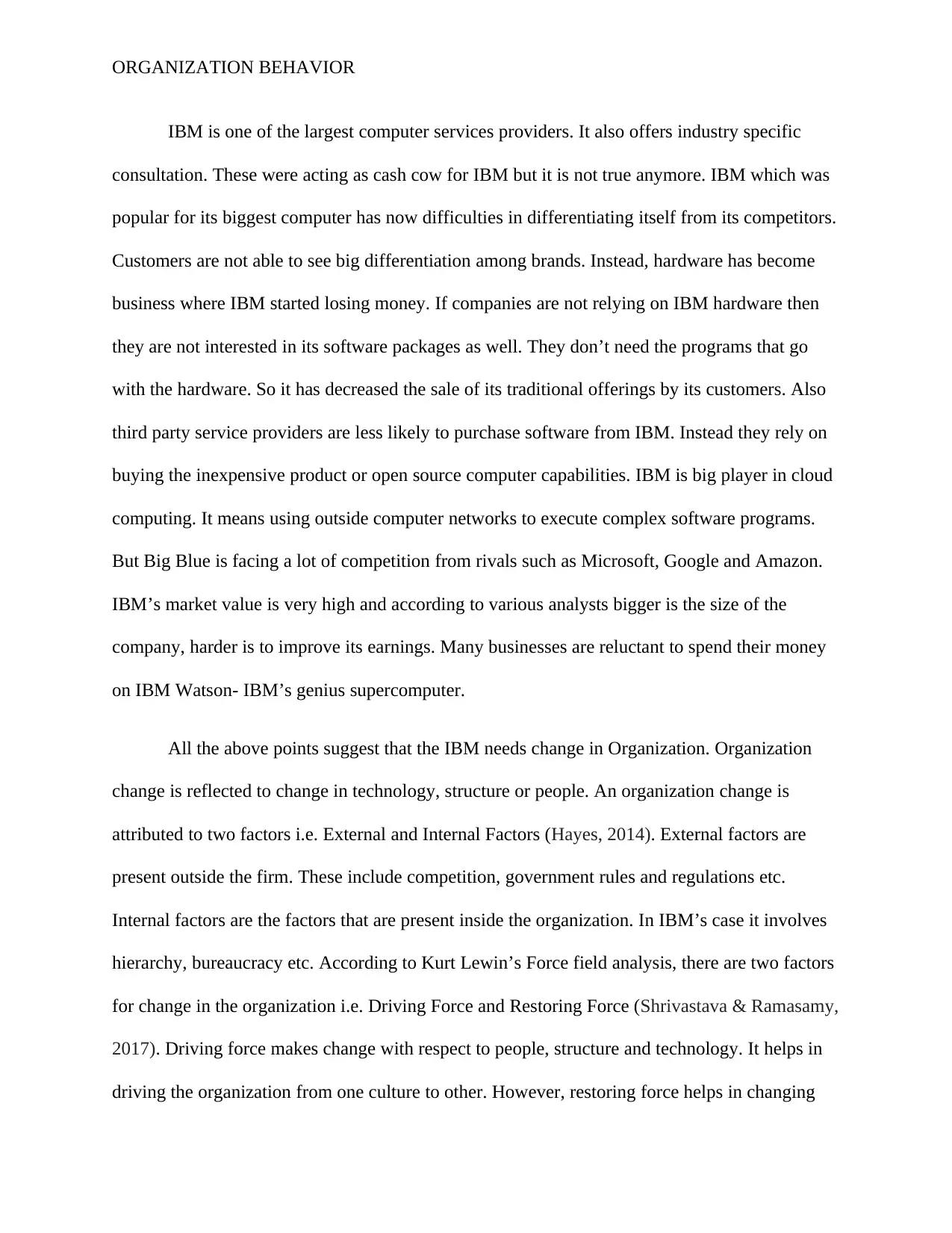
ORGANIZATION BEHAVIOR
IBM is one of the largest computer services providers. It also offers industry specific
consultation. These were acting as cash cow for IBM but it is not true anymore. IBM which was
popular for its biggest computer has now difficulties in differentiating itself from its competitors.
Customers are not able to see big differentiation among brands. Instead, hardware has become
business where IBM started losing money. If companies are not relying on IBM hardware then
they are not interested in its software packages as well. They don’t need the programs that go
with the hardware. So it has decreased the sale of its traditional offerings by its customers. Also
third party service providers are less likely to purchase software from IBM. Instead they rely on
buying the inexpensive product or open source computer capabilities. IBM is big player in cloud
computing. It means using outside computer networks to execute complex software programs.
But Big Blue is facing a lot of competition from rivals such as Microsoft, Google and Amazon.
IBM’s market value is very high and according to various analysts bigger is the size of the
company, harder is to improve its earnings. Many businesses are reluctant to spend their money
on IBM Watson- IBM’s genius supercomputer.
All the above points suggest that the IBM needs change in Organization. Organization
change is reflected to change in technology, structure or people. An organization change is
attributed to two factors i.e. External and Internal Factors (Hayes, 2014). External factors are
present outside the firm. These include competition, government rules and regulations etc.
Internal factors are the factors that are present inside the organization. In IBM’s case it involves
hierarchy, bureaucracy etc. According to Kurt Lewin’s Force field analysis, there are two factors
for change in the organization i.e. Driving Force and Restoring Force (Shrivastava & Ramasamy,
2017). Driving force makes change with respect to people, structure and technology. It helps in
driving the organization from one culture to other. However, restoring force helps in changing
IBM is one of the largest computer services providers. It also offers industry specific
consultation. These were acting as cash cow for IBM but it is not true anymore. IBM which was
popular for its biggest computer has now difficulties in differentiating itself from its competitors.
Customers are not able to see big differentiation among brands. Instead, hardware has become
business where IBM started losing money. If companies are not relying on IBM hardware then
they are not interested in its software packages as well. They don’t need the programs that go
with the hardware. So it has decreased the sale of its traditional offerings by its customers. Also
third party service providers are less likely to purchase software from IBM. Instead they rely on
buying the inexpensive product or open source computer capabilities. IBM is big player in cloud
computing. It means using outside computer networks to execute complex software programs.
But Big Blue is facing a lot of competition from rivals such as Microsoft, Google and Amazon.
IBM’s market value is very high and according to various analysts bigger is the size of the
company, harder is to improve its earnings. Many businesses are reluctant to spend their money
on IBM Watson- IBM’s genius supercomputer.
All the above points suggest that the IBM needs change in Organization. Organization
change is reflected to change in technology, structure or people. An organization change is
attributed to two factors i.e. External and Internal Factors (Hayes, 2014). External factors are
present outside the firm. These include competition, government rules and regulations etc.
Internal factors are the factors that are present inside the organization. In IBM’s case it involves
hierarchy, bureaucracy etc. According to Kurt Lewin’s Force field analysis, there are two factors
for change in the organization i.e. Driving Force and Restoring Force (Shrivastava & Ramasamy,
2017). Driving force makes change with respect to people, structure and technology. It helps in
driving the organization from one culture to other. However, restoring force helps in changing
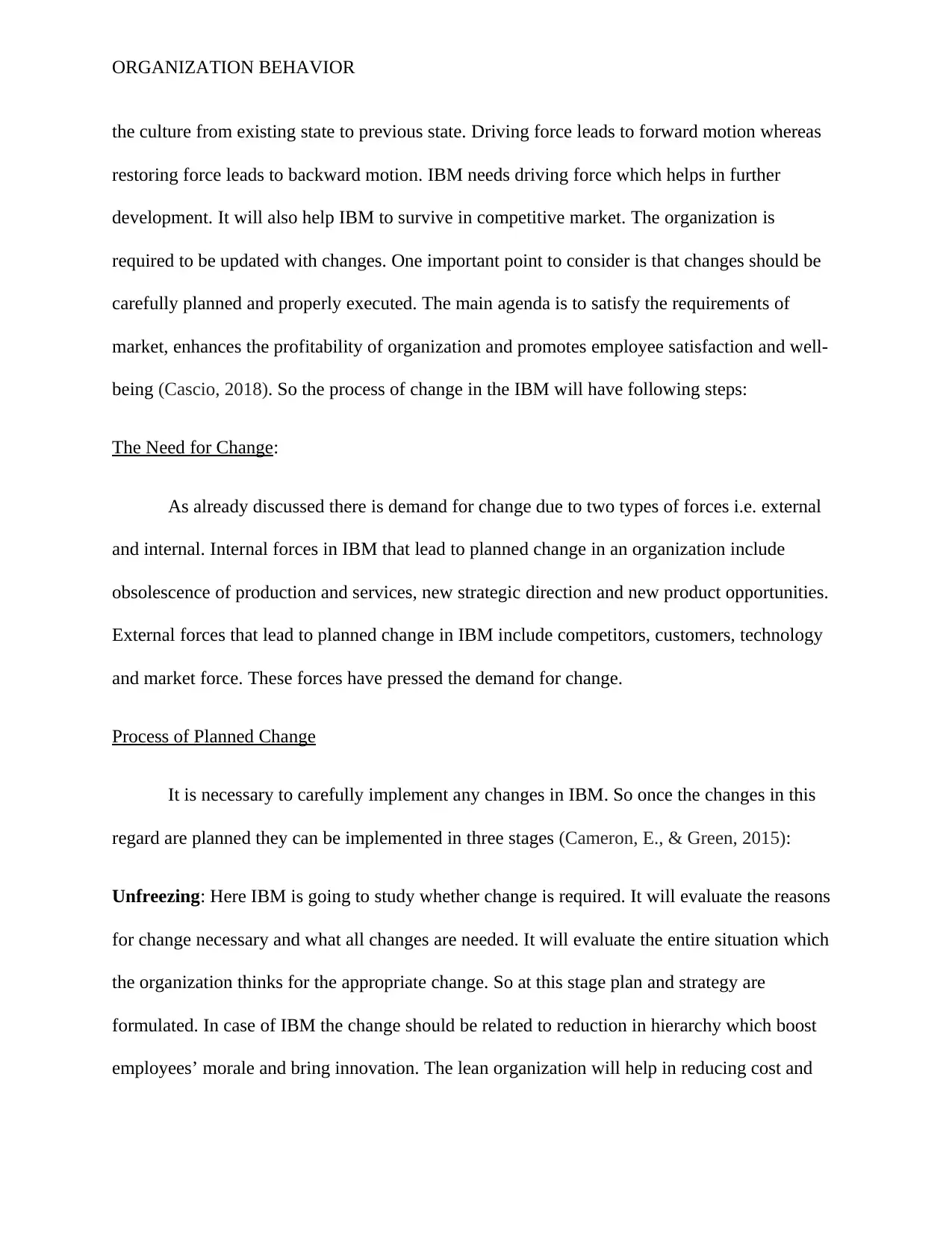
ORGANIZATION BEHAVIOR
the culture from existing state to previous state. Driving force leads to forward motion whereas
restoring force leads to backward motion. IBM needs driving force which helps in further
development. It will also help IBM to survive in competitive market. The organization is
required to be updated with changes. One important point to consider is that changes should be
carefully planned and properly executed. The main agenda is to satisfy the requirements of
market, enhances the profitability of organization and promotes employee satisfaction and well-
being (Cascio, 2018). So the process of change in the IBM will have following steps:
The Need for Change:
As already discussed there is demand for change due to two types of forces i.e. external
and internal. Internal forces in IBM that lead to planned change in an organization include
obsolescence of production and services, new strategic direction and new product opportunities.
External forces that lead to planned change in IBM include competitors, customers, technology
and market force. These forces have pressed the demand for change.
Process of Planned Change
It is necessary to carefully implement any changes in IBM. So once the changes in this
regard are planned they can be implemented in three stages (Cameron, E., & Green, 2015):
Unfreezing: Here IBM is going to study whether change is required. It will evaluate the reasons
for change necessary and what all changes are needed. It will evaluate the entire situation which
the organization thinks for the appropriate change. So at this stage plan and strategy are
formulated. In case of IBM the change should be related to reduction in hierarchy which boost
employees’ morale and bring innovation. The lean organization will help in reducing cost and
the culture from existing state to previous state. Driving force leads to forward motion whereas
restoring force leads to backward motion. IBM needs driving force which helps in further
development. It will also help IBM to survive in competitive market. The organization is
required to be updated with changes. One important point to consider is that changes should be
carefully planned and properly executed. The main agenda is to satisfy the requirements of
market, enhances the profitability of organization and promotes employee satisfaction and well-
being (Cascio, 2018). So the process of change in the IBM will have following steps:
The Need for Change:
As already discussed there is demand for change due to two types of forces i.e. external
and internal. Internal forces in IBM that lead to planned change in an organization include
obsolescence of production and services, new strategic direction and new product opportunities.
External forces that lead to planned change in IBM include competitors, customers, technology
and market force. These forces have pressed the demand for change.
Process of Planned Change
It is necessary to carefully implement any changes in IBM. So once the changes in this
regard are planned they can be implemented in three stages (Cameron, E., & Green, 2015):
Unfreezing: Here IBM is going to study whether change is required. It will evaluate the reasons
for change necessary and what all changes are needed. It will evaluate the entire situation which
the organization thinks for the appropriate change. So at this stage plan and strategy are
formulated. In case of IBM the change should be related to reduction in hierarchy which boost
employees’ morale and bring innovation. The lean organization will help in reducing cost and
⊘ This is a preview!⊘
Do you want full access?
Subscribe today to unlock all pages.

Trusted by 1+ million students worldwide
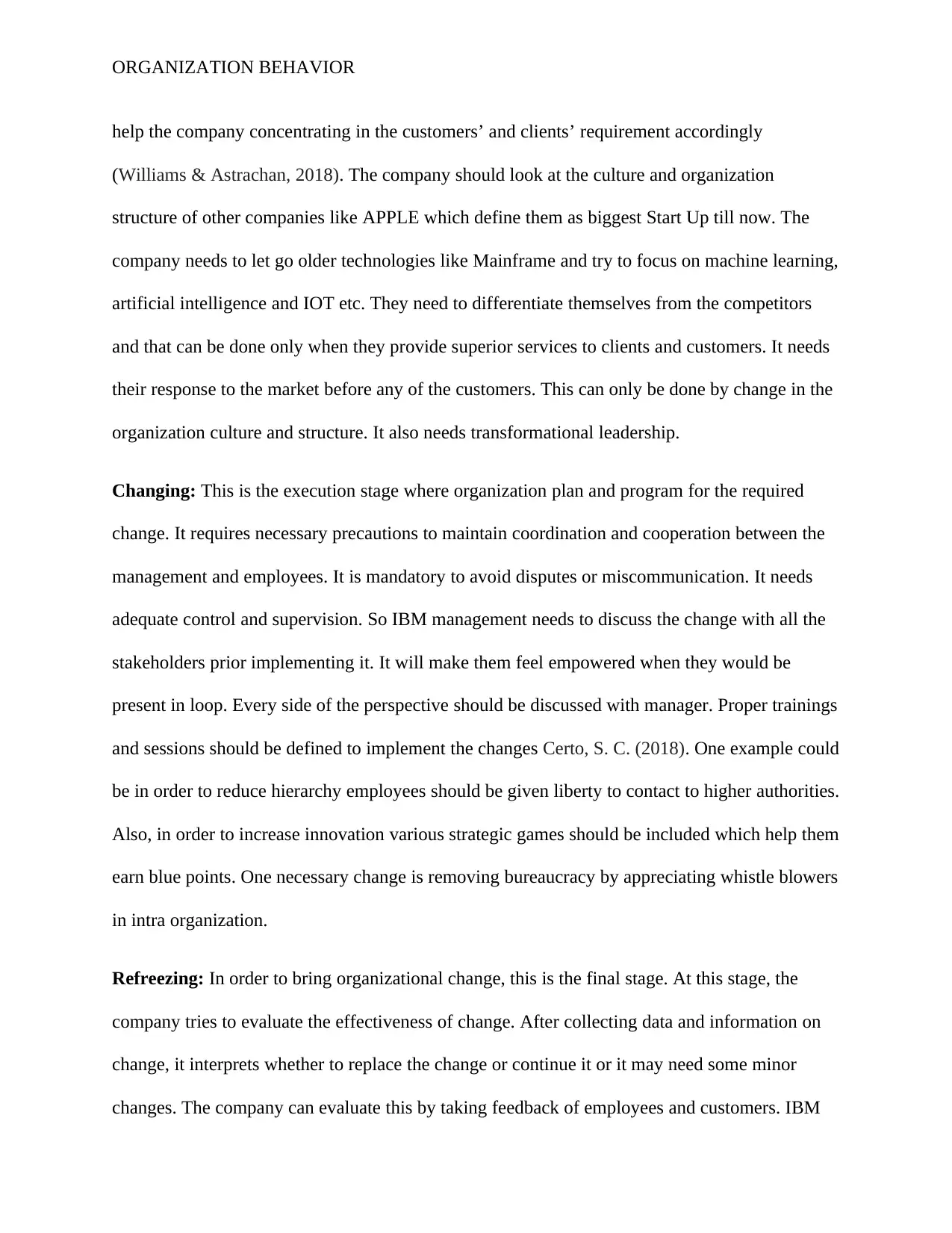
ORGANIZATION BEHAVIOR
help the company concentrating in the customers’ and clients’ requirement accordingly
(Williams & Astrachan, 2018). The company should look at the culture and organization
structure of other companies like APPLE which define them as biggest Start Up till now. The
company needs to let go older technologies like Mainframe and try to focus on machine learning,
artificial intelligence and IOT etc. They need to differentiate themselves from the competitors
and that can be done only when they provide superior services to clients and customers. It needs
their response to the market before any of the customers. This can only be done by change in the
organization culture and structure. It also needs transformational leadership.
Changing: This is the execution stage where organization plan and program for the required
change. It requires necessary precautions to maintain coordination and cooperation between the
management and employees. It is mandatory to avoid disputes or miscommunication. It needs
adequate control and supervision. So IBM management needs to discuss the change with all the
stakeholders prior implementing it. It will make them feel empowered when they would be
present in loop. Every side of the perspective should be discussed with manager. Proper trainings
and sessions should be defined to implement the changes Certo, S. C. (2018). One example could
be in order to reduce hierarchy employees should be given liberty to contact to higher authorities.
Also, in order to increase innovation various strategic games should be included which help them
earn blue points. One necessary change is removing bureaucracy by appreciating whistle blowers
in intra organization.
Refreezing: In order to bring organizational change, this is the final stage. At this stage, the
company tries to evaluate the effectiveness of change. After collecting data and information on
change, it interprets whether to replace the change or continue it or it may need some minor
changes. The company can evaluate this by taking feedback of employees and customers. IBM
help the company concentrating in the customers’ and clients’ requirement accordingly
(Williams & Astrachan, 2018). The company should look at the culture and organization
structure of other companies like APPLE which define them as biggest Start Up till now. The
company needs to let go older technologies like Mainframe and try to focus on machine learning,
artificial intelligence and IOT etc. They need to differentiate themselves from the competitors
and that can be done only when they provide superior services to clients and customers. It needs
their response to the market before any of the customers. This can only be done by change in the
organization culture and structure. It also needs transformational leadership.
Changing: This is the execution stage where organization plan and program for the required
change. It requires necessary precautions to maintain coordination and cooperation between the
management and employees. It is mandatory to avoid disputes or miscommunication. It needs
adequate control and supervision. So IBM management needs to discuss the change with all the
stakeholders prior implementing it. It will make them feel empowered when they would be
present in loop. Every side of the perspective should be discussed with manager. Proper trainings
and sessions should be defined to implement the changes Certo, S. C. (2018). One example could
be in order to reduce hierarchy employees should be given liberty to contact to higher authorities.
Also, in order to increase innovation various strategic games should be included which help them
earn blue points. One necessary change is removing bureaucracy by appreciating whistle blowers
in intra organization.
Refreezing: In order to bring organizational change, this is the final stage. At this stage, the
company tries to evaluate the effectiveness of change. After collecting data and information on
change, it interprets whether to replace the change or continue it or it may need some minor
changes. The company can evaluate this by taking feedback of employees and customers. IBM
Paraphrase This Document
Need a fresh take? Get an instant paraphrase of this document with our AI Paraphraser
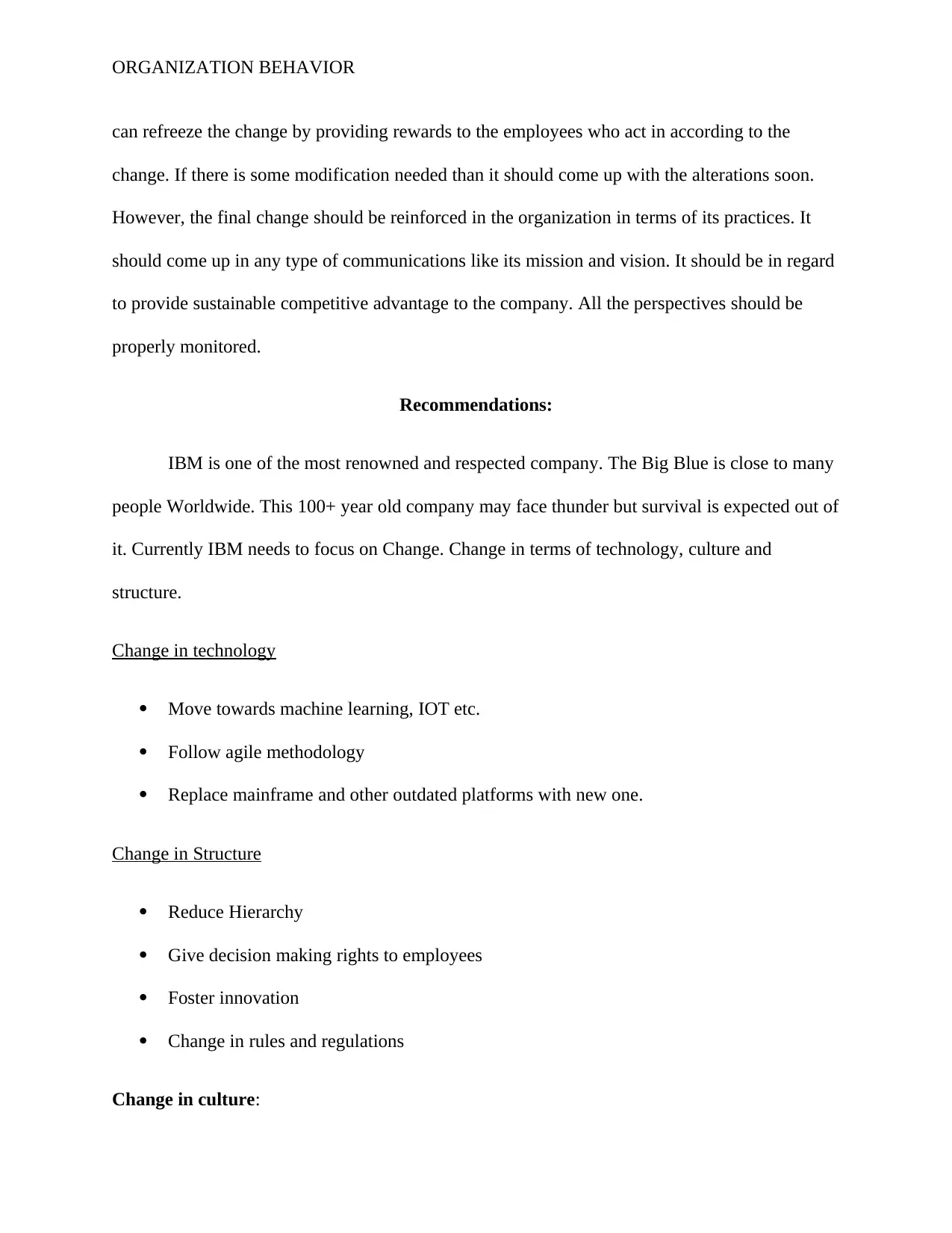
ORGANIZATION BEHAVIOR
can refreeze the change by providing rewards to the employees who act in according to the
change. If there is some modification needed than it should come up with the alterations soon.
However, the final change should be reinforced in the organization in terms of its practices. It
should come up in any type of communications like its mission and vision. It should be in regard
to provide sustainable competitive advantage to the company. All the perspectives should be
properly monitored.
Recommendations:
IBM is one of the most renowned and respected company. The Big Blue is close to many
people Worldwide. This 100+ year old company may face thunder but survival is expected out of
it. Currently IBM needs to focus on Change. Change in terms of technology, culture and
structure.
Change in technology
Move towards machine learning, IOT etc.
Follow agile methodology
Replace mainframe and other outdated platforms with new one.
Change in Structure
Reduce Hierarchy
Give decision making rights to employees
Foster innovation
Change in rules and regulations
Change in culture:
can refreeze the change by providing rewards to the employees who act in according to the
change. If there is some modification needed than it should come up with the alterations soon.
However, the final change should be reinforced in the organization in terms of its practices. It
should come up in any type of communications like its mission and vision. It should be in regard
to provide sustainable competitive advantage to the company. All the perspectives should be
properly monitored.
Recommendations:
IBM is one of the most renowned and respected company. The Big Blue is close to many
people Worldwide. This 100+ year old company may face thunder but survival is expected out of
it. Currently IBM needs to focus on Change. Change in terms of technology, culture and
structure.
Change in technology
Move towards machine learning, IOT etc.
Follow agile methodology
Replace mainframe and other outdated platforms with new one.
Change in Structure
Reduce Hierarchy
Give decision making rights to employees
Foster innovation
Change in rules and regulations
Change in culture:
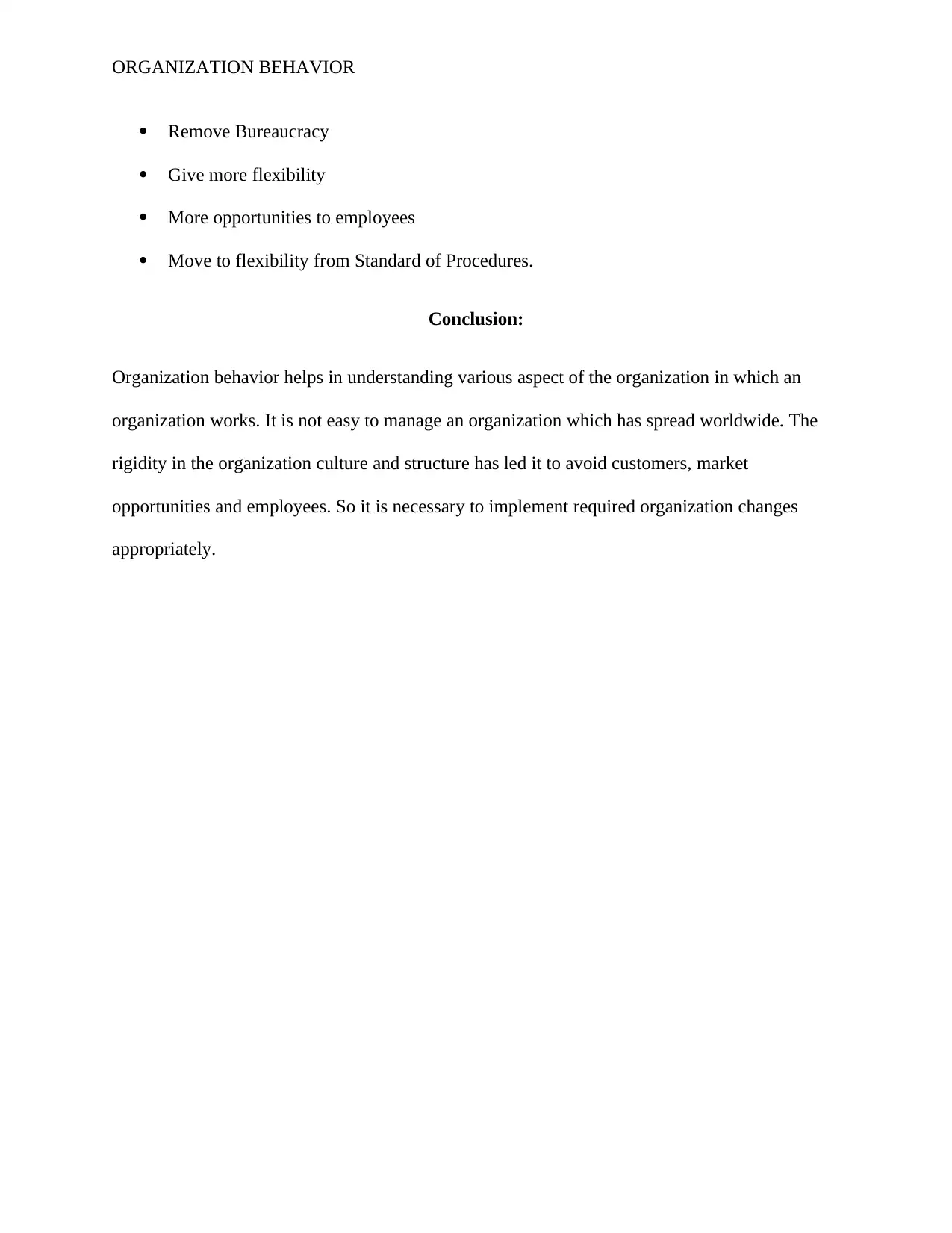
ORGANIZATION BEHAVIOR
Remove Bureaucracy
Give more flexibility
More opportunities to employees
Move to flexibility from Standard of Procedures.
Conclusion:
Organization behavior helps in understanding various aspect of the organization in which an
organization works. It is not easy to manage an organization which has spread worldwide. The
rigidity in the organization culture and structure has led it to avoid customers, market
opportunities and employees. So it is necessary to implement required organization changes
appropriately.
Remove Bureaucracy
Give more flexibility
More opportunities to employees
Move to flexibility from Standard of Procedures.
Conclusion:
Organization behavior helps in understanding various aspect of the organization in which an
organization works. It is not easy to manage an organization which has spread worldwide. The
rigidity in the organization culture and structure has led it to avoid customers, market
opportunities and employees. So it is necessary to implement required organization changes
appropriately.
⊘ This is a preview!⊘
Do you want full access?
Subscribe today to unlock all pages.

Trusted by 1+ million students worldwide
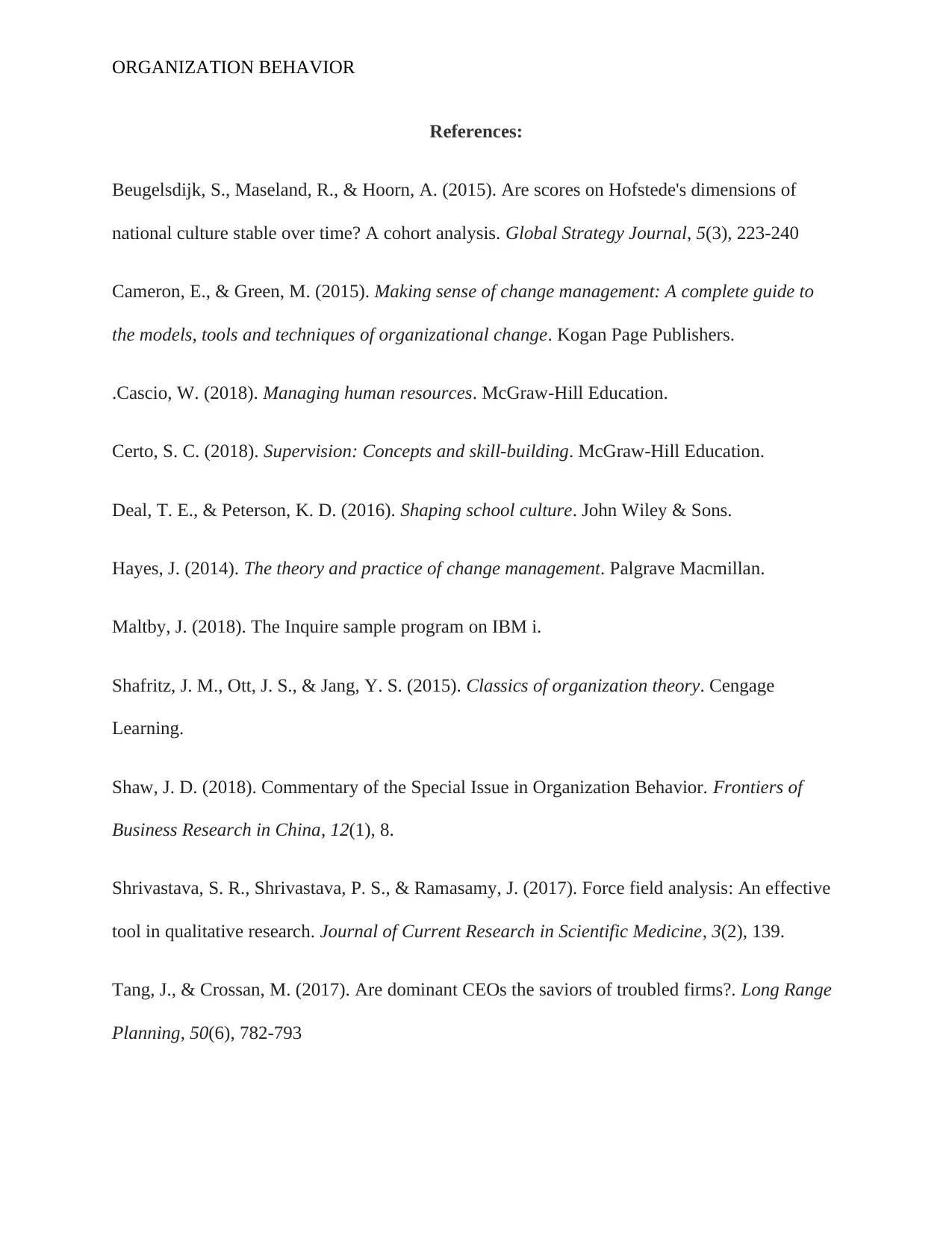
ORGANIZATION BEHAVIOR
References:
Beugelsdijk, S., Maseland, R., & Hoorn, A. (2015). Are scores on Hofstede's dimensions of
national culture stable over time? A cohort analysis. Global Strategy Journal, 5(3), 223-240
Cameron, E., & Green, M. (2015). Making sense of change management: A complete guide to
the models, tools and techniques of organizational change. Kogan Page Publishers.
.Cascio, W. (2018). Managing human resources. McGraw-Hill Education.
Certo, S. C. (2018). Supervision: Concepts and skill-building. McGraw-Hill Education.
Deal, T. E., & Peterson, K. D. (2016). Shaping school culture. John Wiley & Sons.
Hayes, J. (2014). The theory and practice of change management. Palgrave Macmillan.
Maltby, J. (2018). The Inquire sample program on IBM i.
Shafritz, J. M., Ott, J. S., & Jang, Y. S. (2015). Classics of organization theory. Cengage
Learning.
Shaw, J. D. (2018). Commentary of the Special Issue in Organization Behavior. Frontiers of
Business Research in China, 12(1), 8.
Shrivastava, S. R., Shrivastava, P. S., & Ramasamy, J. (2017). Force field analysis: An effective
tool in qualitative research. Journal of Current Research in Scientific Medicine, 3(2), 139.
Tang, J., & Crossan, M. (2017). Are dominant CEOs the saviors of troubled firms?. Long Range
Planning, 50(6), 782-793
References:
Beugelsdijk, S., Maseland, R., & Hoorn, A. (2015). Are scores on Hofstede's dimensions of
national culture stable over time? A cohort analysis. Global Strategy Journal, 5(3), 223-240
Cameron, E., & Green, M. (2015). Making sense of change management: A complete guide to
the models, tools and techniques of organizational change. Kogan Page Publishers.
.Cascio, W. (2018). Managing human resources. McGraw-Hill Education.
Certo, S. C. (2018). Supervision: Concepts and skill-building. McGraw-Hill Education.
Deal, T. E., & Peterson, K. D. (2016). Shaping school culture. John Wiley & Sons.
Hayes, J. (2014). The theory and practice of change management. Palgrave Macmillan.
Maltby, J. (2018). The Inquire sample program on IBM i.
Shafritz, J. M., Ott, J. S., & Jang, Y. S. (2015). Classics of organization theory. Cengage
Learning.
Shaw, J. D. (2018). Commentary of the Special Issue in Organization Behavior. Frontiers of
Business Research in China, 12(1), 8.
Shrivastava, S. R., Shrivastava, P. S., & Ramasamy, J. (2017). Force field analysis: An effective
tool in qualitative research. Journal of Current Research in Scientific Medicine, 3(2), 139.
Tang, J., & Crossan, M. (2017). Are dominant CEOs the saviors of troubled firms?. Long Range
Planning, 50(6), 782-793
Paraphrase This Document
Need a fresh take? Get an instant paraphrase of this document with our AI Paraphraser
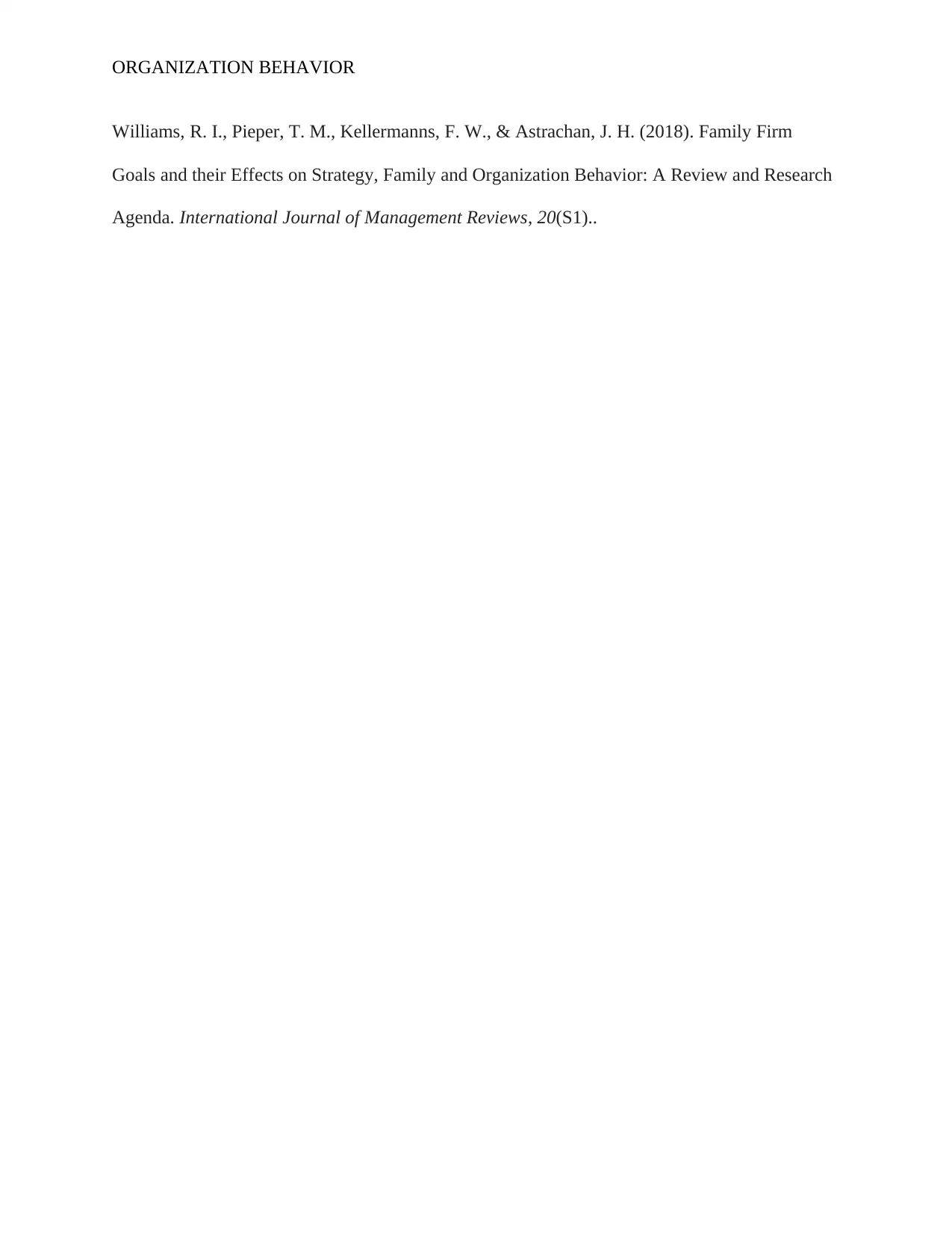
ORGANIZATION BEHAVIOR
Williams, R. I., Pieper, T. M., Kellermanns, F. W., & Astrachan, J. H. (2018). Family Firm
Goals and their Effects on Strategy, Family and Organization Behavior: A Review and Research
Agenda. International Journal of Management Reviews, 20(S1)..
Williams, R. I., Pieper, T. M., Kellermanns, F. W., & Astrachan, J. H. (2018). Family Firm
Goals and their Effects on Strategy, Family and Organization Behavior: A Review and Research
Agenda. International Journal of Management Reviews, 20(S1)..
1 out of 11
Related Documents
Your All-in-One AI-Powered Toolkit for Academic Success.
+13062052269
info@desklib.com
Available 24*7 on WhatsApp / Email
![[object Object]](/_next/static/media/star-bottom.7253800d.svg)
Unlock your academic potential
Copyright © 2020–2026 A2Z Services. All Rights Reserved. Developed and managed by ZUCOL.





